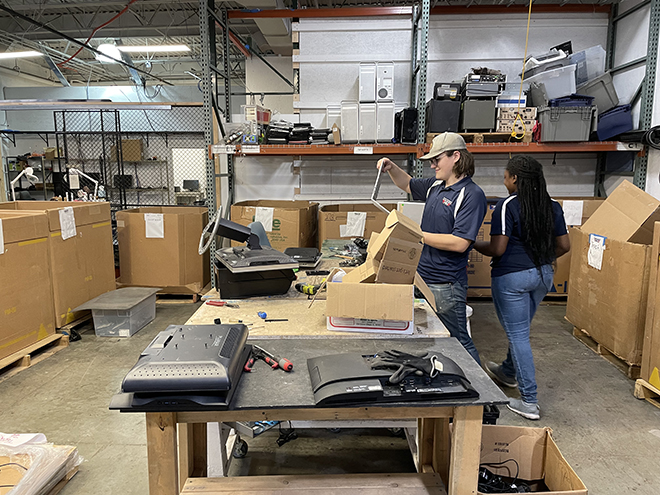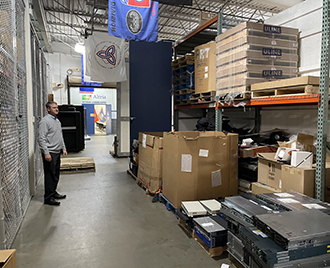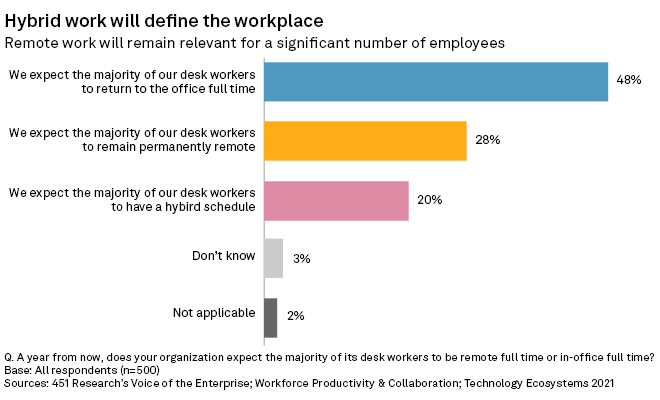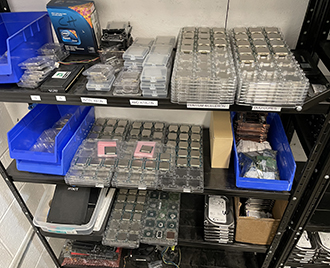Featured Topics
Featured Products
Events
S&P Global Offerings
Featured Topics
Featured Products
Events
S&P Global Offerings
Featured Topics
Featured Products
Events
S&P Global Offerings
Featured Topics
Featured Products
Events
Financial and Market intelligence
Fundamental & Alternative Datasets
Government & Defense
Professional Services
Banking & Capital Markets
Economy & Finance
Energy Transition & Sustainability
Technology & Innovation
Podcasts & Newsletters
Financial and Market intelligence
Fundamental & Alternative Datasets
Government & Defense
Professional Services
Banking & Capital Markets
Economy & Finance
Energy Transition & Sustainability
Technology & Innovation
Podcasts & Newsletters
15 Jun, 2022

|
Workers at Tech for Troops, a nonprofit that refurbishes devices mainly for U.S. military veterans and their families, tend to a laptop in Richmond, VA. |
Affordable internet service is a major policy goal of the Biden administration, but cheap internet does not help families lacking a laptop or other connected device.
The term "digital divide" has often been used to describe a lack of access to broadband, but as the White House and other agencies work to address internet access costs, many say enabling access to computers required for accessing the internet has not gotten enough attention.
"Everybody started coming to this realization that having pipe laid down to your house or your apartment or your neighborhood doesn't do you a lot of good if you don't have a device to access it," said Michael Abensour, chief impact officer at the technology access organization Compudopt and former senior vice president of policy at refurbishing group Human I-T.
A couple of bills aim to address this issue. The Computers for Veterans and Students Act, or COVS Act, introduced last May by Rep. Abigail Spanberger, D-Va., orders the General Services Administration to direct repairable, out-of-service federal computers to nonprofit refurbishers that can repair and distribute those devices to students, veterans, older adults, people with disabilities and to school districts. The bill also comes with digital literacy training, which some organizations like Tech for Troops provide.
The Device Access for Every American Act — backed by Sen. Raphael Warnock, D-Ga., and Rep. Donald McEachin, D-Va. — would grant up to two $400 device vouchers to qualifying households. The legislation was added in the Build Back Better Act, where it was retitled the Connected Device Grant Program.
Both bills face a time crunch as the U.S. heads toward midterm elections in November, though lawmakers are confident each has a significant fighting chance.
COVS Act
Spanberger remains particularly bullish on the COVS Act, which is co-sponsored by Rep. Robert Wittman, R-Va., and two other Democrats in the House of Representatives.
She was inspired to draft the bill after visiting Tech for Troops, a nonprofit that refurbishes devices mainly for U.S. military veterans and their families. During her visit, she spoke with veterans, including some who experienced homelessness as a result of not having access to basic online functions such as banking, education and job searching.
 Mark Casper stands in Tech for Troops' 7,000 square-foot facility, which holds laptops, desktops and other electronics. Mark Casper stands in Tech for Troops' 7,000 square-foot facility, which holds laptops, desktops and other electronics. |
"As it relates to excess or used government items, there can be a lot of red tape in permitting the donation of such devices," Spanberger told S&P Global Market Intelligence, adding that directing excess laptops and computers right to refurbishers can ensure they go to a home in need of getting online.
Federal support would make a major difference to Tech for Troops, said Mark Casper, a former marine who now heads the nonprofit.
"If we had enough computers, we could theoretically wipe and image 140 a day," he said, up from between 25 and 50 per day now. Tech for Troops could also expand into more cities.
"If the federal legislation goes through ... we'd be able to send out more computers to veterans and their families," said Casper.
The need for devices
Without a connected device at home, families are at an extreme disadvantage.
"Your kids aren't getting online to keep up their education. Your wife's not going to get a job," Casper said. "It creates a cycle of poverty."
Forty percent of low-income households — defined by total income under $30,000 per year — do not have a device, according to June 2021 data published by Pew Research. The gap is felt especially in Black and Latinx communities, whose households are over two times more likely to not have a device than that of a white household, according to a 2022 National Urban League report.
The statistics underscore the 21st-century necessity of owning a computer in order to economically thrive. A 2021 451 Research report shows that 48% of organizations expect remote work to remain relevant for a significant number of their employees by either working remotely full-time or adopting a hybrid work model.

McEachin, who backs the Connected Device Grant Program, told Market Intelligence a lack of devices is particularly a problem in some of the Virginian communities he serves.
"[People] are losing economic opportunities. They're losing in part because of a lack of broadband, but also in part because they don't have a workforce that knows how to use these devices in the first instance, or even have access to these devices," he said in an interview.
Existing programs
The FCC in an email to Market Intelligence said its Affordable Connectivity Program lets qualifying households receive a one-time discount of up to $100 for a laptop, tablet or desktop computer. The agency's Emergency Connectivity Fund was also highlighted, where schools and libraries can obtain devices and hotspots at caps of $400 and $250, respectively.
An FCC spokesperson did not provide a response when asked if the commission supports device legislation in Congress.
While a $100 discount is helpful, the Warnock-McEachin program better reflects the cost of commercial devices on shelves whose sticker prices have increased amid chip pressures, said Jenna Leventoff, senior policy counsel at digital advocacy group Public Knowledge.
The bill also provides up to two vouchers per household. In low-income homes with just one computer, children and their caretakers must share a device, limiting how and when they can log on to complete tasks like homework or a telehealth appointment.
"Forcing families to make those kinds of choices is just unacceptable," Leventoff said.
The National Telecommunications and Information Administration did not respond to a request for comment. Its Digital Equity Grant program and Broadband Equity, Access and Deployment program can be used to obtain devices, but the funding decisions are made by individual states and do not guarantee any increase in device availability.
Outside of the government, there are voluntary industry-led programs such as Comcast Corp.'s Internet Essentials, which allows qualifying households to purchase a new Dell Technologies Inc. laptop or Chromebook for $149.99 plus tax.
Fighting e-waste and the chip shortage
Sources see several advantages to the bills over existing programs, especially in terms of the COVS Act, which relies on refurbished devices. Refurbishing includes wiping user data, adding memory and cleaning.
Digitunity, an umbrella organization for groups dedicated to closing technology gaps, estimates that nonprofit refurbishers in its network diverted about 6.5 million pounds of e-waste away from landfills in 2021 when they deployed devices to underserved communities. Scot Henley, Digitunity's executive director, says legislation like the COVS Act would help amplify efforts to keep old machines away from waste piles.
"Any time you're able to extend the life of [a device] and take it out of its first use and use it to improve the lives of folks is going to keep it out of the waste stream," Henley said.
Tech for Troops, a Digitunity member, recycled about 112,000 pounds of equipment alone in 2021.
The bills can also alleviate pricing and inventory pressures caused by the chip shortage since most refurbished computers do not require a new chip, Henley and others said.
 Shelves of essential computer hardware at Tech for Troops. Shelves of essential computer hardware at Tech for Troops. |
For computers that are too old, some parts are still useful for other machines that need parts replaced. Components can also be sold off to wholesalers to allow refurbishing organizations to continue operating. In the Tech for Troops supply room, for instance, shelving units contain stacks of processors, integrated circuits and other hardware available for use.
Clock ticking
The House Oversight Committee advanced Spanberger's COVS Act in early April. It still awaits a vote on the House floor as well as support in the Senate, with Spanberger noting that, while her bill has support on both sides of the aisle, there is an "issue of awareness" around it. She said her office continues to work on signing on more House-side sponsors while garnering voices in the Senate before the midterms.
The McEachin-Warnock subsidy program faces a unique climb as a piece of legislation propped under Build Back Better. But McEachin said the broadband and telecommunications aspects of the shelved social spending framework are noncontroversial compared to other provisions.
There is "no reason" for the bill to not be passed, he said. McEachin pictures lawmakers treating the program as a separate subsidy bill and hopes for more progress before the month-long Congressional recess in August.
451 Research is part of S&P Global Market Intelligence.
